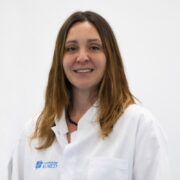
Biography
Dr Maria A. Morando received her Master’s Degree in Chemistry in 2005 from the University of Pavia. In 2007, Maria obtained a Marie Curie Training Network PhD Fellowship at the CIB-CSIC in Madrid, where she conducted her doctoral project concerning the analysis of carbohydrate conformations and their molecular recognition processes, under the supervision of Prof Jesus Jimenez-Barbero. From 2010 to 2012, Maria was PostDoc at the CNIO-CSIC in Madrid under the supervision of Prof. Francesco Gervasio. During this period, Maria worked on the structural characterization of interactions of anticancer drugs and tyrosine kinases. From 2013 to 2018, Maria conducted a second period as PostDoc at the Fundação Oswaldo Cruz in Rio de Janeiro. During this period, Maria studied the structure and dynamics of Flavivirus viral proteins (e.g. Dengue and Zika). Since 2018, Maria has been working at the Ri.MED Foundation as a protein NMR specialist in the Structural Biology and Biophysics group.
Scientific Activity
Maria’s research focuses on the understanding of intricate molecular recognition processes at the atomic level. Her expertise is primarily centered on developing structural models for proteins and elucidating their interactions, especially those that play pivotal roles in critical pathological processes. Maria employs a range of biophysical techniques with a particular emphasis on utilizing Nuclear Magnetic Resonance (NMR) to obtain the experimental structure of proteins in solution, and to characterize molecular interactions with different NMR-based approaches: Ligand-base experiments as STD, trNOE and DOSY, and protein-based experiments as Chemical shift perturbation (CSP) and dynamics experiments. Additionally, she employs computational studies as docking and molecular dynamic simulation to complement and reinforce experimental findings. While supporting the research activities of the group of Structural Biology and Biophysics, Maria main research project is dedicated to the characterization of structure and interactions of adhesive mussel foot proteins to understand the molecular basis of their adhesive properties for medical application as bio-adhesive.
https://orcid.org/0000-0002-7349-3876
